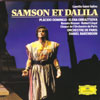Saint-Saëns Samson et Dalila
View record and artist detailsRecord and Artist Details
Composer or Director: Camille Saint-Saëns
Genre:
Opera
Label: DG
Magazine Review Date: 11/1991
Media Format: CD or Download
Media Runtime: 126
Mastering:
Stereo
ADD
Catalogue Number: 413 297-2GX2

Tracks:
| Composition | Artist Credit |
|---|---|
| Samson et Dalila |
Camille Saint-Saëns, Composer
Camille Saint-Saëns, Composer Constantin Zaharia, First Philistine, Tenor Daniel Barenboim, Conductor Elena Obraztsova, Dalila, Mezzo soprano Gérard Friedmann, Messenger, Tenor Marcus Huber, Second Philistine, Bass Orchestre de Paris Paris Orchestra Chorus Pierre Thau, Abimélech, Bass Plácido Domingo, Samson, Tenor Renato Bruson, High Priest, Baritone Robert Lloyd, Old Hebrew, Bass |
Author: Alan Blyth
This is a spacious, thoughtful, grand reading, deriving from performances in the Roman arena at Orange in 1978. As there Barenboim realizes the stature of this still underrated score and has the Paris forces, then under his directorship, in idiomatic support. Excellently balanced, it gives the travails of the Israelites and the rejoicing of the Dagon pagans just the right profile. All the supporting roles are well taken with special praise due to Thau's Abimelech and Lloyd's moving Old Hebrew.
Domingo as Samson, in his very best voice, is notable for his defiant heroism and dignity in his later misery, and he sings French with a deal of feeling for the language's nuances. That can hardly be said for Obraztsova's harshly sung Delilah. She is somewhat too much of the devil rather than the seductress. Besides, her line in her important solos is often bumpy, the registers never integrated. Bruson is an appropriately hectoring High Priest, but his tone isn't always keenly focused.
The rival versions have much to offer. Davis (Philips) knows and loves the score, and is also supported by splendid forces, but like Barenboim is inclined to take too much of the music below the composer's metronome marks. Pretre (EMI) is better in that respect and perhaps has, by a small margin, the most satisfying cast, headed by Gorr's resplendent Delilah and Vickers's impassioned Samson, not better than but different from Domingo's.'
Domingo as Samson, in his very best voice, is notable for his defiant heroism and dignity in his later misery, and he sings French with a deal of feeling for the language's nuances. That can hardly be said for Obraztsova's harshly sung Delilah. She is somewhat too much of the devil rather than the seductress. Besides, her line in her important solos is often bumpy, the registers never integrated. Bruson is an appropriately hectoring High Priest, but his tone isn't always keenly focused.
The rival versions have much to offer. Davis (Philips) knows and loves the score, and is also supported by splendid forces, but like Barenboim is inclined to take too much of the music below the composer's metronome marks. Pretre (EMI) is better in that respect and perhaps has, by a small margin, the most satisfying cast, headed by Gorr's resplendent Delilah and Vickers's impassioned Samson, not better than but different from Domingo's.'
Discover the world's largest classical music catalogue with Presto Music.

Gramophone Digital Club
- Digital Edition
- Digital Archive
- Reviews Database
- Full website access
From £8.75 / month
Subscribe
Gramophone Full Club
- Print Edition
- Digital Edition
- Digital Archive
- Reviews Database
- Full website access
From £11.00 / month
Subscribe
If you are a library, university or other organisation that would be interested in an institutional subscription to Gramophone please click here for further information.




